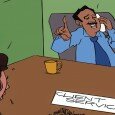By Xari Jalil –
LAHORE: Zafar* Shah is in deep trouble. He shopped on his credit card about a year ago, and is unable to pay it off. He has only been able to pay a bare minimum of Rs5000 a month but in the meantime, his credit has been increasing and now, with interest added, it has totaled up to a huge amount.
“When I used my card, of course I was aware of the problems attached, but did not imagine I would end being a defaulter for so long,” he said. “I thought I would pay it off as soon as possible, but some unexpected expenditures made me delay that, and now here I am,” he laments.
It was not like he had borrowed money from a friend or relative that he could easily have spaced out paying back. Banks and the credit system do not wait for anyone, or sympathize with genuine personal problems.
Of course it is not as if credit cards are never beneficial. In fact they could work to the greatest advantage for many people. A credit card can help increase credit ratings before the card holder looks for a loan especially when purchasing an expensive product such as a car. And the offers are sometimes so attractive that card holders end up digging themselves into a deep hole of debt.
Financial consultants in banks and sales persons who also collect credit card payments are the ones who see people the most – people who are drowning in a never ending whirlpool of debts and who have no idea anymore of what to do. They often express the idea of helplessness and despair because they have little idea where to get so much money from, and if they do not procure the required amount in time, such as a month, interest rates will end up increasing the principal amount.
“Many people make the mistake of enhancing their lifestyle with a credit card,” says a financial consultant of a private bank. “They end up spending more than they earn, and then pay a percentage on that amount. For many people it can be up to five to seven years after the borrowed amount,” he explains.
A salesman who has a clear idea on this issue says that he often collects cash from people who cannot for some reason come to the bank to pay themselves. He says that he has about 50 customers, while other salesmen in the same bank have more. “It goes to show that the trend of using a credit card is catching up with more and more people.”
Faisal Ali, an independent financial consultant, says that the problem is that people mistake credit cards for actual money. “No I am not saying they are stupid, but this is the way credit cards project themselves. Many people end up feeling that if they have Rs5000 in credit they actually have Rs5000 in cash. Then they do not really worry about paying bills and go right ahead shopping. In reality, of course, that is not the case. “In a short amount of time little purchases can become massively expensive as unpaid bills start to generate interest. Then you’re dead,” he says half seriously.
But in reality H* who was also deep in debt in 2006, ended up in killing himself because he did not know how to pay off the debt anymore. The family, who were living in Karachi, chose to keep the incident under cover, especially to protect his identity. H*’s credit card bills had increased to over a Rs100,000 over some simple grocery shopping, while he earned only Rs35,000 a month. The bank never let him forget it. There were reminder phone calls throughout the month, especially towards the due date; there were bill collectors coming over at his house to procure the money from him, and letters were sent to him. All of these contributed in harassing him more than the problem itself. Eventually H* saw no way out and in desperation ended his life. But even then the credit problem did not end. It was merely passed on to his next of kin to pay.
Though this was a miserable incident and such drastic measures are extremely rare, consumers are commonly quite shocked when they get to know of unpaid bills totaling a number larger than they had originally thought.
But all is not always dark. Credit cards can actually end up in being quite helpful and can rescue someone from an unexpected situation. “When we had a baby the hospital charged us much more than we had anticipated,” says Naila, a housewife. “We were not prepared for Rs.30, 000 increase including ICU charges post-surgery and other small bills that added up. But my husband’s credit card helped us pay these and leave.”
Hospitals are infamous for over-charging, especially if a patient is brought in due to unexpected illnesses. “Many hospitals end up performing unnecessary tests just to increase the amount you pay and this ends up in adding a lot of money. A person does not always have this amount of cash. In that case a credit card will always help,” says Irfan Ahmed whose father is in hospital. “Definitely it comes as a blessing at such a time.”
Likewise the situation does not need to be necessarily one of utter importance, but sometimes a person needs a lot of money to pay for something. In general the trend is to pay for electronic items or other more expensive products which are sold on credit cards.
A shop in Cavalry, Lahore, called B* Electronics is one such shop which deals in televisions, cameras, etc.
Shop attendant Ashfaque* highlights the use of credit cards and their importance for both consumer and seller. “From a shop keeper’s point of view we find it better and more trustworthy to be paid via credit card,” he says. “No one wants to go around collecting installments so we, along with other electronics dealers wish to receive complete payment at once. We have less chances of being swindled. Contrary to credit card scares, there are very uncommon instances of scams. For the consumer it is also better to pay all at once and then just have the bank deduct from their account,” he continues.
TVs, laptops, cameras, sound systems, are some of what are sold the most on cards, while he says that new cars are also the most common expenditure on credit cards. As for checking the validity of the card, he says there are tools including online tools for checking whether the card can be used or not.
Another kind of shopping that credit cards have an edge over is online shopping. Slowly as the world becomes plastic with more and more use of credit, online shopping too prompts the use of cards over anything else. Books and other products which are not found in Pakistan are now being ordered increasingly. Pakistani consumers do not tend to spend credit on things that are easily accessible just for the convenience of ordering. In fact local shopping websites such as daraz.pk and kaymu.pk give the option of cash on delivery instead of card payment online. This is mainly because Pakistan has less use of credit cards generally and also because the websites aim to give the shopper the convenience of ordering from home, otherwise the consumer can easily go out and buy the same product.
Other examples of important credit card expenditures include air ticket, hotel rooms, emergency cash while travelling etc.
The key therefore is to use credit cards responsibly. Financial consultants all advise against the use of credit cards without being completely aware of the information regarding them and their use. They say that everything even the interest rate should be well in the mind of the consumer, before spending their credit on anything. Preferably, small items should not be bought on credit because these can add up later.
Some Tips On Using Credit Cards
1. When you make a purchase with the credit card, it is akin to taking a loan from your bank. What you have borrowed has to be returned – so do not borrow beyond your capacity to pay it back.
2. Always maintain a record of your credit card balances during a month so that you are aware of what you have already spent. This will help you evaluate if you can make any more purchases in that month as even small purchases can add up to large balances.
3. Retain all receipts at least until you can compare them to the credit card monthly statement. If some purchases do not match or if some charges are higher than those on the receipt, immediately contact your credit card company.
4. Never give out your credit card to anyone! This includes people in your family and any of your friends. It is not that you cannot trust these individuals, but you cannot track purchases you are not even making.
5. When you charge more than you can repay, a lot can go wrong. This can limit your future potential of getting any kind of credit, including car loans, home mortgages and other forms of loans.
6. Pay your credit card bills on time or even before they are due. Doing so will not only help improve your credit scores, but also help avoid additional costs associated with late payment charges and accrued interest.
7. Pay your credit card bills in full every month. This is easy to do if, based on your income, you establish a monthly budget for your credit card purchases and then not exceed that.
8. Keep your credit cards for new purchasing. Don’t pay one credit card bill with a different credit card. This will inevitably lead to more charging and higher balances.
*Names changed to hide identity
 The writer is journalist based in Lahore. She is an IVLP alumni and currently doing hers Masters in Criminology
The writer is journalist based in Lahore. She is an IVLP alumni and currently doing hers Masters in Criminology































































































